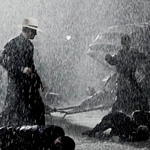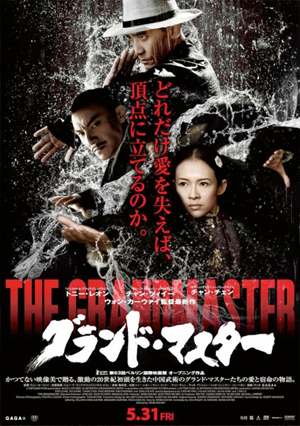 NOTE: A couple weeks ago I watched Wong Kar Wai’s long-awaited Ip Man movie THE GRANDMASTER on an import DVD. I loved it so much I decided not to post a review until the U.S. theatrical release so more people would be able to see it and discuss it.
NOTE: A couple weeks ago I watched Wong Kar Wai’s long-awaited Ip Man movie THE GRANDMASTER on an import DVD. I loved it so much I decided not to post a review until the U.S. theatrical release so more people would be able to see it and discuss it.
Then I saw an ad on TV calling the movie “Martin Scorsese presents THE GRANDMASTER,” talking about “THE MAN WHO TAUGHT BRUCE LEE,” and showing a bunch of fight scenes with an aggressive hip hop soundtrack. There’s an even more extreme one online now that uses the theme from THE MAN WITH THE IRON FISTS.
These ads gave me a laugh, because as great as the fights are in the movie the emphasis is on characters and metaphors and beautiful imagery, and it’s as much about Zhang Ziyi’s Gong Er (a fictional character, I believe) as a biography of Ip Man. I was excit ed to see it on the big screen, but dreading the possibility of an audience angry at the long breaks between punching.
ed to see it on the big screen, but dreading the possibility of an audience angry at the long breaks between punching.
What didn’t occur to me is that maybe the breaks aren’t that long anymore. It turns out the U.S. theatrical cut is a Weinsteinized version that’s 22 minutes shorter. David Ehrlich of film.com explains that the new cut was done with the participation of Wong, and details all the things he noticed that were cut out. I won’t spoil whether or not he likes the new version, you’ll just have to read his article Kung Foolish: How The American Cut of ‘The Grandmaster’ Ruins a Masterpiece to find out for yourself.
I still plan to see it, but based on Ehrlich’s list it sounds like half of the themes and scenes I talk about in this review aren’t even in the movie anymore. So fuck it, here is my review of the 130-minutes-including-credits Suitable-For-The-Entire-World-Except-For-America-Because-How-Could-They-Ever-Understand-It Cut.
You know, I’ve been hearing about Wong Kar Wai for years, but I don’t remember if I’ve even watched any of his movies. If I did it was CHUNG KING EXPRESS back in the days of being wild, and it quickly left my brain. I know people who swear by 2046, IN THE MOOD FOR THE LOVE, etc. I know his reputation but I can’t pretend to know his work. It’s clear now that he has a big pair of artistic balls, though, to want to do a movie about Ip Man when he did.
Think about it: IP MAN is a modern martial arts favorite around the world, it spawned an also great sequel and unofficial prequel, and also a FINAL FIGHT and maybe a part 3D? It also won the Hong Kong equivalent of the best picture Oscar. Think about it. What if, I don’t know, David Cronenberg or somebody said “Nah, fuck ARGO, I’m doing my Tony Mendez movie.” That’s kinda what he’s doing here. “My style is better.”
But to tell you the truth there’s not that much overlap between this and the other Ip Man pictures. We see a bit about his privileged upbringing and mansion life, a bit about how much he loves his wife, a bit about opening his first school. Even that part, the teaching, is not heavily emphasized. As in the others, the Second Sino-Japanese War is crucial, and the bombing of his home is dealt with in text. But it isn’t another movie about suffering humiliation and oppression under the Japanese occupation. It mostly takes place before and after the war, dealing with the old “martial world” – the clans that followed codes of honor and protected family legacies – and how its survivors deal with the modern world of wall-to-wall kung fu schools. Whether they choose to evolve with the times or stay behind.
You assume the title refers to Great Grandmaster Ip Man, but I’m not so sure. In a way it’s just as much about the Grandmaster of the North, Gong Yutian (Wang Qingxiang) who upon his retirement offers a challenge for the greatest fighter from the south to take him on. Of course the masters all get together and point their fingers at Ip Man (the great Tony Leung Chiu-Wai of HARD BOILED, CHUNGKING EXPRESS, HERO, INFERNAL AFFAIRS, RED CLIFF, etc.). Even though he’s younger than them at 40 and doesn’t think he deserves it he gets pushed into it. He acquits himself well, fulfilling Yutian’s secret goal of creating opportunity for younger martial artists and for the region. Moving things along.
 But the Grandmaster’s two successors – total asshole student Ma San (Zhang Jin) and stubborn daughter Gong Er (Zhang Ziyi) – don’t take it in the spirit intended. They are not sportsmanlike about it at all. In fact Er challenges Ip Man to a fight. Since it’s inside a place full of opulent decor they agree that the first to break something loses (reminiscent of the great IP MAN fight where there’s alot of concern about the safety of Ms. Ip’s furniture and vases).
But the Grandmaster’s two successors – total asshole student Ma San (Zhang Jin) and stubborn daughter Gong Er (Zhang Ziyi) – don’t take it in the spirit intended. They are not sportsmanlike about it at all. In fact Er challenges Ip Man to a fight. Since it’s inside a place full of opulent decor they agree that the first to break something loses (reminiscent of the great IP MAN fight where there’s alot of concern about the safety of Ms. Ip’s furniture and vases).
I’d been warned that the fights aren’t shot clearly despite being choreographed by Yuen Woo Ping. I’m happy to disagree. It’s a somewhat different approach, fetishizing impact: hits sending people hurling through the air, closeups of nails tearing through wood as it splits, a head crushing the edge of a brick wall, shards of glass hitting pavement. Precipitation is important – more than one fight takes place in a rain storm, Ip Man and his opponents splashing water from the flooded streets like the final dance in STEP UP 2. Other scenes take place in a beautiful snow fall. There are closeups of rain drops hitting, or blood drops hitting puddles of rain. There’s alot of focus on a wrought iron gate reflected or shadowed in puddles. I think it’s the same gate that Ip Man busts open using Cung Le as a battering ram in the opening fight. I think it means something. I’m not sure what yet.
Another obsession: feet. He likes shooting just their slippered feet, showing their delicate steps or their footwork. It shows how nimble they are. Fighting as ballet.
The fight with Gong Er is a great one not just because of the acrobatics and the don’t-break-anything-gimmick (in a movie where the camera seems obsessed with the effects of people thrown through windows, mirrors, tables, walls, etc.) but because it spins the story off in a different direction. It becomes about this unrequited love story of a woman who clearly has a thing for Ip Man but also takes a vow against ever marrying or having kids. From Ip Man’s perspective I think you could read it as longing (don’t worry, he has lost his family to the war at this point) or merely as a genuine interest in convincing her to share her unique fighting style with the world. Or at least with him.
That’s the other great thing about the fight: she uses the 64 Hands, which her father has taught only to her. And it’s treated not as a deadly style, but as a beautiful expression. Using it against Ip Man is sharing herself with him, and she later speaks of the style metaphorically. She’s trying to teach him with it. That’s my favorite thing about THE GRANDMASTER is the way it uses fighting styles and moves as metaphors. They’re not just ways to kick ass, they are ideas.
Another example of this happens when Ma San (SPOILER) kills his master, inspiring Gong Er to sacrifice any happiness in life to get revenge. Before his death Yutian reveals to Ma San that the key to his “Supreme Move,” which is called “Old Monkey Hangs Up His Badge,” is to look back. He’s not just revealing his fighting secret, he’s offering his heartfelt advice. Fighting is talking about life.
(In related news, I gotta come up with my Supreme Move. I don’t think I have one yet.)
These fighters are poets. They love metaphors. They talk about their actions as a blade inside a sheath, or a log in a fire, or a pot of snake stew. They talk about their lives as seasons, as opera, as chess.
There are alot of interesting characters besides Ip Man. One in particular, The Razor Yixiantian (Chen Chang), leaves you wanting more. I kinda forgot who he was by the time he showed up in the later days working in a barbershop. You have to wonder – did he always like cutting hair, and that’s why he was nicknamed the Razor? Is The Razor ending up a barber an ironic coincidence? Is it a code so that people can find him? Is it his idea of a joke? I don’t know, but any of those are pretty awesome. It definitely seems like there must’ve been more about this guy in Wong’s unreleased 4 hour version.
Leung and Ziyi both give some of their best performances, both emotionally and physically. Hats off especially to Leung for being a non martial artist who trained in Wing Chun and made it look good. And I appreciate that even after decades pass they aren’t hidden behind old age makeup. Wong figures fuck it, gives them subtle signs of age, and lets them just play it as older.
IP MAN is appealing for its balance of spectacular fights and effective character drama, but it’s definitely a fight movie. THE GRANDMASTER leans away from fight movie and more into operatic melodrama and visual poetry. But it still includes a ton of my favorite fight movie elements: challenge fights, one-on-many street brawls, loyal bodyguards (this one with a pet monkey!), legendary fighting styles, training by a series of specialists, revenge for the killing of a master (and father). These things don’t feel like the point of the movie, but they deliver above and beyond the call of duty.
Take for example the scene in 1950 when Ip Man is questioned about his skills by young thugs allegedly interested in joining his school. This is one of the few scenes that plays like a standard IP MAN or FIST OF FURY type badass teacher scenario. They outnumber him and are trying to intimidate him, but he scares them by demanding “Lock the gates!” Then he proceeds to demonstrate each of the Wing Chun kicks, in order, on them. He allows himself a rare bit of cockiness here, telling a guy “That one’s free” after a painful “lesson.”
But while generously giving us the goods, Wong also explores the ethics of martial arts in interesting ways. When Er decides to seek vengeance she’s going against her father’s dying wish, as well as his students’ very convincing arguments. She and Ma San represent the last vestiges of his teachings, his unification of styles. If they fight it breaks that unity and will forever end one of his two styles. It would bring shame upon the school and end his legacy.
But she decides she won’t be at peace without revenge, so she does it anyway, and what’s worse as part of her quest she takes a vow to never marry, have kids or teach. (I’m not sure if that’s based on an actual tradition or is just a convenient gimmick to get to the emotions Wong wants to get to.) So she’s lonely and sad and can’t pass on the 64 Hands. Ip Man tries to convince her to teach it, or at least show it to him again. As a teacher, we’re told (and already know), he goes on to influence many people and pass on a legacy. As much as we admire him and his cool white hat we’re left mourning all those who weren’t able to do that, those who left behind nothing but the group photos we keep seeing them pose for. Their beautiful movements and metaphors, for whatever reason, evaporated with the rain.


























August 21st, 2013 at 2:24 am
I can’t say that I’m a huge fan of Wong kar wai’s movies, but I recognize him as an important film maker. And you just don’t butcher the work of important film makers. What do they hope to achieve? Sure, you can rope in some action fans that wouldn’t normally go to see a film like this, but those who know anything about movies see both Tony Leung and Wong kar wai’s name on the poster and know immedeately what kind of movie this is.